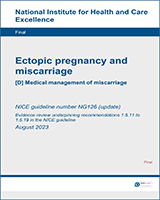|
Chu 2020
Randomised Control Trial
UK (Multi-Centre- 28 UK hospitals)
|
N=711
Mifepristone plus misoprostol group: n= 357
Placebo plus misoprostol group: n= 354
Maternal age (years):
Mifepristone plus misoprostol group: 32.8 ± 5.6
Placebo plus misoprostol group: 32.7 ± 5.5
BMI (kg/m2):
Mifepristone plus misoprostol group: 25.8 ± 5.6
Placebo plus misoprostol group: 26.5 ± 5.5
| 200mg oral Mifepristone plus 800 micrograms vaginal, oral, or sublingual misoprostol | Oral placebo plus 800 micrograms vaginal, oral, or sublingual misoprostol |
Failure to spontaneously pass the gestational sac within 7 days after random assignment. Surgical intervention to complete the miscarriage up to discharge from hospital care. Surgical intervention to complete the miscarriage up to and including 7 days after random assignment. Surgical intervention to complete the miscarriage from after day 7 and up to discharge. Need for further doses of misoprostol within 7 days after random assignment. Need for further doses of misoprostol up to discharge. Infection requiring outpatient antibiotic treatment. Infection requiring inpatient antibiotic treatment. Negative pregnancy test result 21 days (±2 days) after random assignment. Duration of bleeding as reported by the participant. Requirement for blood transfusion. Side-effects. Any serious complications. Maternal death.
|
|
